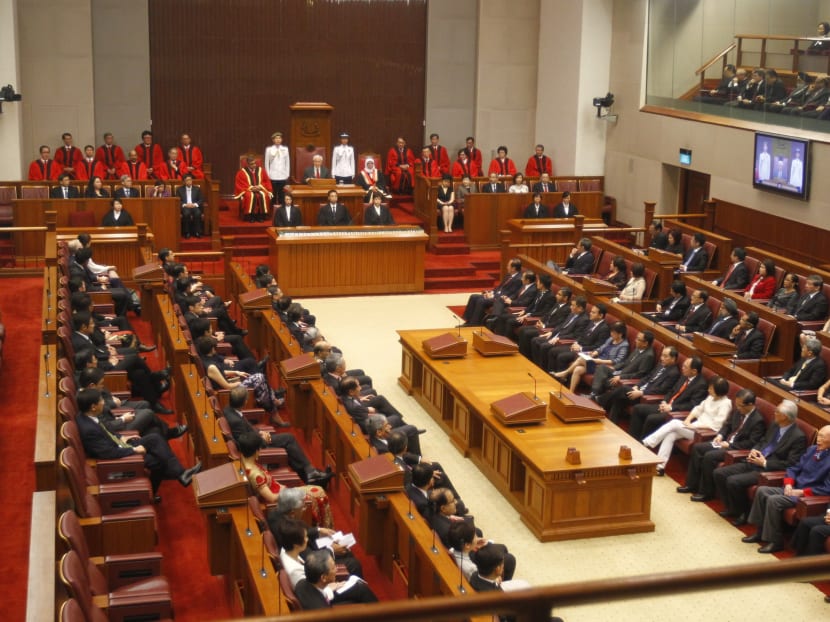Improving the system for selecting NMPs
The public nominations for Nominated Members of Parliament (NMPs) closed on May 20 with 36 applications. They will be assessed by a Special Select Committee, which will then recommend to the President candidates for appointment.

The 12th session of Singapore's Parliament reconvened for its second session today, May 16, 2014. Photo: Ernest Chua
The public nominations for Nominated Members of Parliament (NMPs) closed on May 20 with 36 applications. They will be assessed by a Special Select Committee, which will then recommend to the President candidates for appointment.
The NMP scheme was introduced in 1990 to provide alternative non-partisan views in Parliament and strengthen Singapore’s political system. NMP nominees must have rendered outstanding public service or distinguished themselves in various fields, such as the arts and culture, business, labour movement and community service. An NMP serves a fixed term of two-and-a half years and may vote on all matters except Supply Bills, Money Bills, constitutional amendments, motions of no confidence in the Government and motions to remove the President from office.
It has been almost 25 years since the scheme’s inception, and there is divided opinion on whether it has served Singapore well. Questions also persist on how NMPs are selected and whether the process should be changed.
WHAT DOES IT MEAN TO BE NON-PARTISAN?
As NMPs are supposed to be non-partisan, there has been debate in recent years on whether membership in political parties should disqualify one as a candidate.
Mr Gerard Ee was a People’s Action Party (PAP) member when he became an NMP in 1997. He was reported to have said then that his party membership would not prevent him from expressing independent views in Parliament, since he would not be subject to the party whip as an NMP.
In 2009, public outcry led media entrepreneur Calvin Cheng to quit the Young PAP after he was appointed as an NMP. Two years later, Ms Tan Su Shan resigned as a PAP member before her NMP nomination was put up by the business and industry group.
At the time, former Parliament Speaker Michael Palmer explained in a letter to the media that membership in a political party did not disqualify one from being an NMP. He explained that requiring a person “to formally resign from membership in a political party cannot, in substance, change his political philosophy or his sympathy for the cause of that party. Nor need membership of a political party necessarily affect a person’s objectivity”.
“Ultimately, NMPs will have to prove to both sides of the House, the media and the public that they are credible and non-partisan in the discharge of their constitutional role,” Mr Palmer said.
For NMPs to be truly non-partisan voices in Parliament, the principle of non-partisanship should be applied both in letter and spirit of the institution. This means that non-membership of any political party must be a criterion. Otherwise, the public could misconceive NMPs as not independent and non-partisan. This will diminish public faith in the system and the issues raised by NMPs in Parliament.
Second, while only 10 per cent of the House is made up of NMPs, the number is not insignificant. Should the gap between the number of Members of Parliament (MPs) from the ruling and opposition parties narrow in the future, the support of NMPs in voting for a parliamentary Bill or motion becomes critical.
With more opposition MPs today compared with 25 years ago, the role of NMPs has become more, not less, important. This is because of the greater need for non-partisan views so parliamentary debates do not run along party lines. In today’s increasingly charged political climate, the non-partisan voice is ever more critical. NMPs should freely express their independent views to add robustness to parliamentary debates.
NEED TO REVIEW THE SELECTION PROCESS
What else can we do to ensure that NMPs are non-partisan?
For a start, members of the public who nominate candidates should also not be members of a political party.
Going a step further, I would argue that there is a need to review the selection process by the Special Select Committee. The committee has traditionally been chaired by the Speaker of Parliament and comprises PAP and opposition MPs. Recent committees have also included Cabinet ministers.
If the intention of having NMPs is to have non-partisan voices in Parliament, should not their selection be done by a non-parliamentary committee? Otherwise, they could be perceived as being endorsed or approved by politicians, which would run counter to the spirit of the NMP scheme.
It would be reasonable to suggest that the selection committee be headed by the Speaker of Parliament. It is also acceptable if MPs — not ministers — form a minority of the committee. But the rest of the members should be former NMPs and/or respected independent members of society such as retired judges and civil society leaders.
For transparency, NMPs should be selected based on a majority vote and the results should be made public. This would ensure the NMP scheme is true to its original intent and that NMPs are deemed to be non-partisan.
The NMP scheme is unique in the world and has, on balance, done Singapore more good than harm. But it is not without flaws. Making the selection process more transparent and tightening the non-partisan requirements of NMPs could go some way in improving the scheme.
About the author:
Dr Ameen Talib is an academic and businessman.









